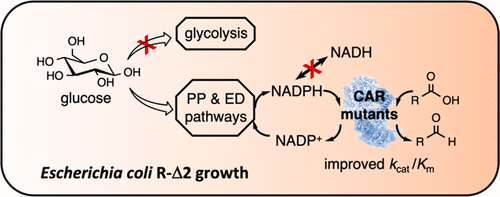当前位置:
X-MOL 学术
›
ACS Synth. Biol.
›
论文详情
Our official English website, www.x-mol.net, welcomes your feedback! (Note: you will need to create a separate account there.)
Engineering Carboxylic Acid Reductase (CAR) through a Whole-Cell Growth-Coupled NADPH Recycling Strategy.
ACS Synthetic Biology ( IF 4.7 ) Pub Date : 2020-06-26 , DOI: 10.1021/acssynbio.0c00290 Levi Kramer 1 , Xuan Le 1 , Marisa Rodriguez 1 , Mark A Wilson 2 , Jiantao Guo 3 , Wei Niu 1
ACS Synthetic Biology ( IF 4.7 ) Pub Date : 2020-06-26 , DOI: 10.1021/acssynbio.0c00290 Levi Kramer 1 , Xuan Le 1 , Marisa Rodriguez 1 , Mark A Wilson 2 , Jiantao Guo 3 , Wei Niu 1
Affiliation

|
Rapid evolution of enzyme activities is often hindered by the lack of efficient and affordable methods to identify beneficial mutants. We report the development of a new growth-coupled selection method for evolving NADPH-consuming enzymes based on the recycling of this redox cofactor. The method relies on a genetically modified Escherichia coli strain, which overaccumulates NADPH. This method was applied to the engineering of a carboxylic acid reductase (CAR) for improved catalytic activities on 2-methoxybenzoate and adipate. Mutant enzymes with up to 17-fold improvement in catalytic efficiency were identified from single-site saturated mutagenesis libraries. Obtained mutants were successfully applied to whole-cell conversions of adipate into 1,6-hexanediol, a C6 monomer commonly used in polymer industry.
中文翻译:

通过全细胞生长耦合的NADPH回收策略工程化羧酸还原酶(CAR)。
缺乏有效和负担得起的鉴定有益突变体的方法常常会阻碍酶活性的快速发展。我们报告了基于这种氧化还原辅因子的循环利用的新的生长耦合选择方法的发展,该选择方法用于进化消耗NADPH的酶。该方法依赖于基因修饰的大肠杆菌菌株,该菌株会过度积累NADPH。此方法应用于羧酸还原酶(CAR)的工程设计,以提高对2-甲氧基苯甲酸酯和己二酸酯的催化活性。从单点饱和诱变文库中鉴定出突变效率最高可提高17倍的突变酶。获得的突变体已成功地应用于己二酸酯向1,6-己二醇(C 6)的全细胞转化 聚合物工业中常用的单体。
更新日期:2020-07-17
中文翻译:

通过全细胞生长耦合的NADPH回收策略工程化羧酸还原酶(CAR)。
缺乏有效和负担得起的鉴定有益突变体的方法常常会阻碍酶活性的快速发展。我们报告了基于这种氧化还原辅因子的循环利用的新的生长耦合选择方法的发展,该选择方法用于进化消耗NADPH的酶。该方法依赖于基因修饰的大肠杆菌菌株,该菌株会过度积累NADPH。此方法应用于羧酸还原酶(CAR)的工程设计,以提高对2-甲氧基苯甲酸酯和己二酸酯的催化活性。从单点饱和诱变文库中鉴定出突变效率最高可提高17倍的突变酶。获得的突变体已成功地应用于己二酸酯向1,6-己二醇(C 6)的全细胞转化 聚合物工业中常用的单体。



























 京公网安备 11010802027423号
京公网安备 11010802027423号